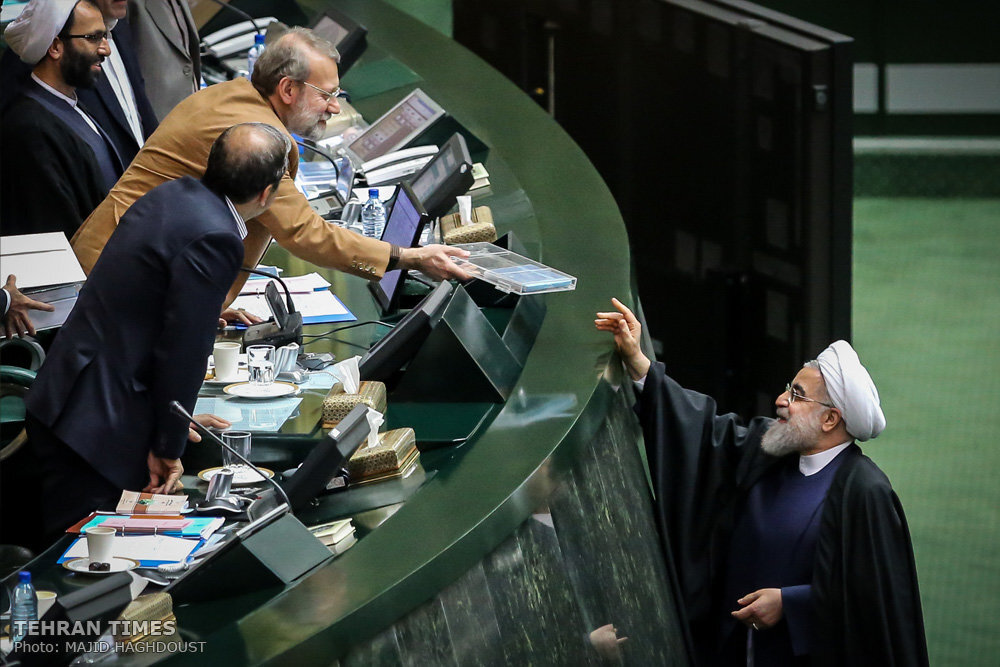Why Majlis rejected the budget bill?

TEHRAN - The Iranian Parliament (Majlis) on Monday rejected general outlines of the national budget bill for the next Iranian calendar year 1399, which starts on March 20, stating that the bill is not compatible with the country’s current economic conditions.
Back in December 2019, after President Hassan Rouhani submitted the administration’s draft of the national budget bill to the Majlis, many economic analysts and experts had expressed concerns over the draft saying that the budget bill hasn’t been prepared based on realistic revenue estimations.
Many predicted the bill to create serious problems for the country’s economy in the upcoming year.
Now that the bill has also been rejected by the members of parliament, it is time to take a more detailed look into the budget bill to see what the reasons for such a unanimous rejection could be.
Oil revenues
The first and most important objection to the budget bill was regarding the unrealistic estimations of the country’s oil revenues considered in preparing the draft.
Iran’s next budget bill has been set based on the prediction of selling one million barrels of oil at $50 per barrel, however, many believe that due to the U.S. sanctions on the country’s oil industry, the Iranian government will not be able to realize this prediction.
The submitted bill has envisaged a total of 2.61 quadrillion rials (about $62.14 billion) of incomes, while revenues from exporting oil, gas, and gas condensate are estimated at 454.9 trillion rials (about $10.83 billion).
These numbers have been opposed by many of the MPs for being unrealistic since the country is currently facing some problems for its oil exports and also the demand for oil is significantly falling in the global markets.
“Unfortunately, the next year's budget includes unrealistic numbers for oil sales, but we have to be realistic and base the budget on realistic figures,” an MP said.
Tax incomes
The government has envisioned various strategies for compensating a probable deficit in the next year’s budget due to the fall in oil revenues.
One of the major measures provisioned for such compensation is said to be increasing the tax revenues.
Tax incomes are predicted to be 1.95 quadrillion rials (about $46.42 billion) in the next year’s budget bill, rising 27 percent from 1.72 quadrillion rials (about $40.95 billion) envisaged in the present year’s budget.
Considering the current economic situation, the question is how much of this revenue can be realized; is the taxpaying population going to expand or tax evasions are going to be eliminated or is the Iranian National Tax Administration (INTA) seeking to put more pressure on existing taxpayers?
Some MPs believe that the envisioned tax income is not in line with the provisions of the country’s Sixth Five-Year National Development Plan (2016-2021).
“Every year’s revenues must be set based upon an estimation of the one-sixth of the total revenue envisaged in the country’s national development plan, and this year’s budget bill is far from such an estimation,” an MP said.
Another issue that was raised by MPs about the tax section of the bill was regarding the current situation of the country’s factories and producers as major taxpayers.
“Our producers are facing many problems for importing their required raw materials and machinery and their production has reduced significantly, so how they are going to pay more tax?” said another MP.
Selling government assets
The government has suggested selling its excess assets as another source for offsetting the next year’s budget deficit, however, parliament members are not convinced that such a program could be fully realized.
In the next year’s budget bill, it has been estimated that the government would gain 490 trillion rials (about $11.6 billion) from the sales of its assets.
However, although last year the government had set a much lower target for the sales of its assets, unfortunately, it couldn’t be realized.
In addition to the transferring assets, using forex reserves, selling Islamic bonds, and withdrawing 450 trillion rials (about $10.714 billion) from National Development Fund, were also among the strategies suggested for compensating budget deficits.
Economic analysts believe that excessive issuance of treasury bonds means creating more liquidity which consequently results in more inflation.
According to the next year’s budget bill, over 1.15 quadrillion rials (about $27.8 billion) is expected to be earned from selling bonds.
“This figure is more than double the previous year’s total development performance, we are putting the country’s future on sale,” an MP stressed.
People’s livelihood
In the next year’s budget bill, the basic salary for workers has been set to be 24 million rials (about $570), 15-percent more than last year’s basic salary.
Many MPs believe that the 15 percent rise which has been envisioned for all workers equally is not fair for all classes of the society.
Considering the inflation rate this amount of increase is not going to be even nearly enough, an MP said.
The government is also going to combine the cash subsidies which was paid to people in the form of two packages, one 450,000 rials (nearly 11 dollars) and one 2,000,000 rials (nearly 48 dollars) for each person, and provide each person with only one 700,000 rials (about 16 dollars) to reduce the government’s expenditures.
“The combination of cash and livelihood subsidies would nearly halve the figure, which will make people unhappy next year,” said an MP.
EF/MA
Leave a Comment